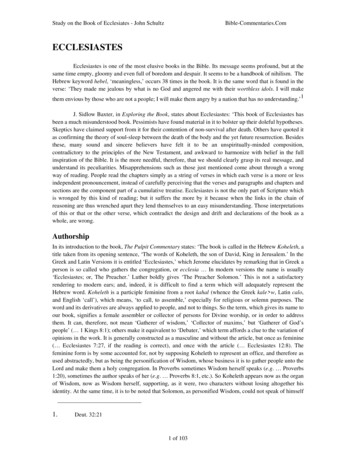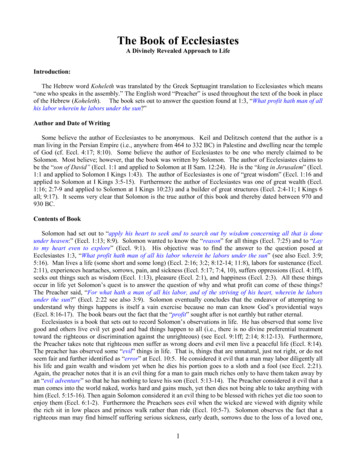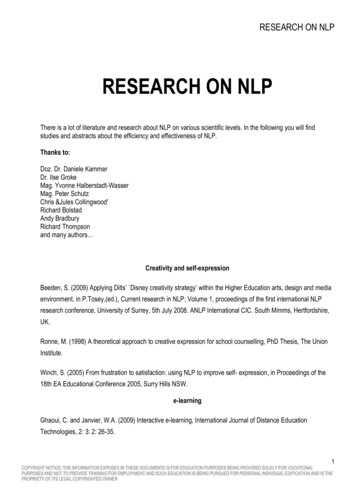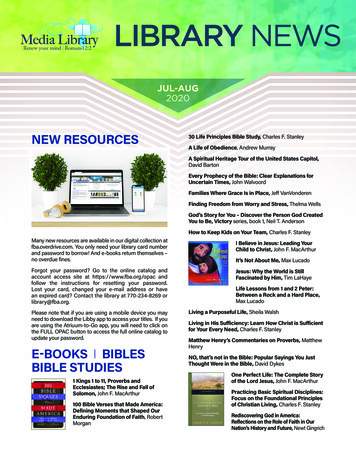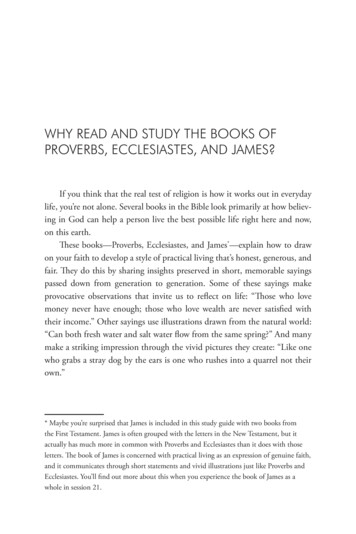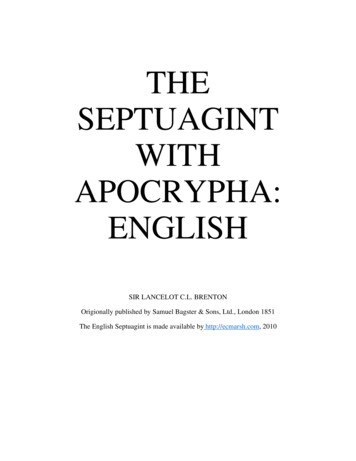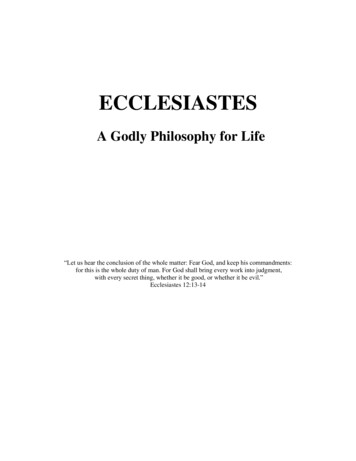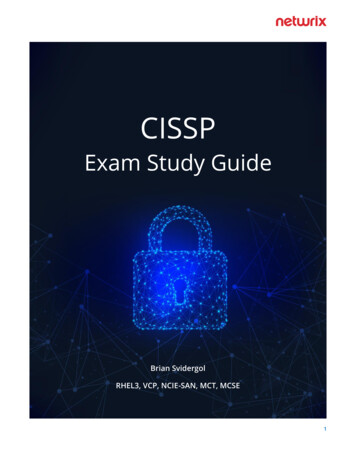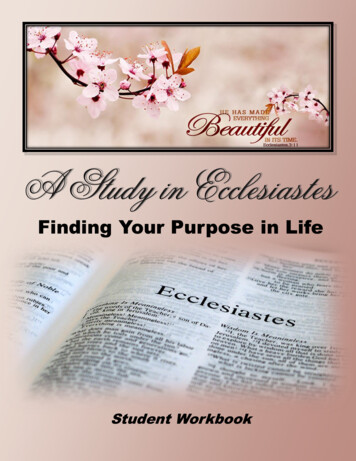
Transcription
A Study in EcclesiastesFinding Your Purpose in LifeStudent Workbook
A Study in EcclesiastesTable of ContentsLesson 1: IntroductionLesson 2: Chapter 1 – Vanity of vanities, all is vanityLesson 3: Chapter 2 – The wisest and the richest still loseLesson 4: Chapter 3:1-15 – To everything there is a season (turn, turn, turn)Lesson 5: Chapter 3:16 – 4:12 – Oppression, toil, and friendshipLesson 6: Chapter 4:13 – 5:12 – How to get a good night’s restLesson 7: Chapter 5:13 – 6:12 – Rich but all aloneLesson 8: Chapter 7:1-12 – Beginnings and endingsLesson 9: Chapter 7:13 – 8:1 – Prosperity and adversityLesson 10: Chapter 8:2 – 17 – The king and deathLesson 11: Chapter 9 – Do it with your might!Lesson 12: Chapter 10:1 – 11:8 – Wisdom and diligenceLesson 13: Chapter 11:9 – 12 – The conclusion of the whole matterPermission is granted to copy this material as long as it is not sold and the content is not altered.Orville VaughnJanuary, 2014Ecclesiastes2
EcclesiastesLesson 1IntroductionLesson Goal:To understand God’s purpose for this book in His holy word. What questions areanswered in this book that are not answered in any other book of the Bible?Text:EcclesiastesIntroductionHave you ever wondered what life is all about? Perhaps one starlit night yougazed up into the vast expanse of heaven and pondered the meaning of life. “Why am Ihere? What is my purpose? As I live day by day, what should I pursue to find meaning,purpose, contentment, and happiness?” These are worthwhile questions and questionsthat any thoughtful person will ask.However, instead of asking these questions many people just let life happen. “Iwas born into these circumstances.” “I got this job.” “I married this person.” “My parentsweren’t religious so I’m not either.” It’s as though instead of thinking and choosing andliving their lives, many simply become spectators of their lives. What a shame; what awaste.Years and years ago there was a very wise man who determined he would notsimply be a spectator of life. He determined to find meaning and purpose to life. Inaddition to being very wise, he also was in the unique position of having tremendouspower and wealth. There was nothing he could not try, buy, build, or consume. He setabout trying everything. And his conclusions are amazing. His journey to reach hisconclusions is even more amazing. He chronicled his journey and conclusions in ajournal titled “Ecclesiastes.” On nearly every page of this man’s journal you will findyourself. His journey and yours are very similar. Let’s take a look.Background of the bookThere is disagreement about who wrote Ecclesiastes. Many scholarly Biblecommentators (Leupold, Delitzsch, et al) contend that the book was not authored by KingSolomon but by one identified simply as Koheleth which is the Hebrew word forpreacher (1:1, 12). They note that there is no mention of Solomon by name anywhere inthe book and the phrase “son of David, King in Jerusalem” (1:1) could have been a broaddescription of one who was faithful to God but not necessarily a physical son of David.The scholars also contend that the suffering and injustice described in portions of theEcclesiastes3
book would not have been consistent with Solomon’s reign as king which was anunparalleled time of peace and prosperity. Finally, the scholars find it troubling thatSolomon could write so eloquently (chapters 12) on life and its meaning when there is noindication that he ever repented of his idolatry brought on by marrying multiple wiveswith various religious beliefs. So their conclusion is that Koheleth authored the booksometime following the return from Babylonian captivity. For parts of the book heappears to take on the perspective of Solomon (1:12 – 2:26) but Koheleth (the preacher)was the author.In spite of scholarly disagreement, I will present this series of lessons from thepoint of view that King Solomon is the human author but I want the reader to understandthat the human author of the book is not positively known and many do not believe (forthe reasons stated above) that it was Solomon. My reasoning is simple. First, I do notintend these short lessons to be a scholarly study of Ecclesiastes but rather a series ofbrief practical lessons on life. To satisfy my objectives, the human author of the book isof little importance. The substance of the message, whether authored by Solomon orKoheleth, is just as powerful and practical and is obviously God’s message to usregarding life “under the sun.” Secondly, I do not have a problem with Solomon (whowe know was granted great wisdom from God) knowing more than he practiced. In otherwords, while his actions later in life are quite sad, I still believe he could have written thewords that tell us to “fear God and keep His commandments.” Many is the person whohas not lived up to God’s standard but it does not mean that they do not understand it.Similarly, I believe Solomon’s wisdom allowed him to see injustice and suffering even ina time of peace and prosperity. Just because Israel was not at war did not mean everyonetreated everyone fairly and his wisdom also allowed him to see injustice in other landsunder foreign kings.Regarding the human author, we cannot be absolutely certain. However,regarding the heavenly author and His message, we all can agree. This book gives aunique description of life on earth (“under the sun”). It is unique from all of the other 65books in God’s Word and it is unique from anything written by man. Those seeking tooffer counsel and guidance to the young, the old, the poor, the rich, the scholar, the uneducated, the grieving, and the rejoicing should carefully study this book over and over.True wisdom comes from above (James 3:17).Questions For Discussion1. Do a word search or internet search to learn the meaning of the word“Ecclesiastes.” Is it Greek, Latin, or Hebrew? What does it mean?2. What does it mean to be wise? How does wisdom differ from knowledge?3. Describe the wisdom God granted to Solomon (see 1 Kings 4:29-34).4. Why was God so generous in granting Solomon wisdom?EcclesiastesRe. 1 Kings 3:7-13.4
5. Can we expect God to be generous to us also when we make requests of Him?See James 1:5-8 and Matthew 7:7-116. What is a journal? Why do people keep them?7. What do we learn about a person when reading their journal? Is a journal areflection of the things most important to that person at that time?8. Has the nature of man changed since the time of Solomon? Can we learnvaluable lessons by reading/studying his journal?9. Do you see wisdom in the world today? If so, where is it and in what form?10. What troubles you most today? Why? Can answers to these troubles be foundin God’s word?Making ApplicationFor just this week (you may continue longer if you choose), keep a journal. Eachday write down the thoughts on your mind. It might be work, it might be family, it mightbe church. The thoughts might be things that are troubling you or they might be thingsthat make you happy. It doesn’t have to be long, eloquent, or detailed. Just write. At theend of the week, go back and read your journal. You may want to quickly categorize yourthoughts for the week (what was most on your mind?): work, family issues, relationships,personal conflicts, injustices in the world, financial problems, good friendships, healthproblems, happy times with family or friends, etc. Don’t make this a huge task (or itwon’t get done) but take 5 or 10 minutes each day and write down what is on your mind.Unlike Solomon’s journal no one else ever needs to see it or read it.Ecclesiastes5
EcclesiastesLesson 2Vanity of Vanities, All Is VanityLesson Goal:To understand the key message in the first chapter of the book and to make application inour lives today.Text:Ecclesiastes Chapter 1IntroductionSolomon begins his journal by figuratively “throwing up his hands” in despair.All is lost, there is no meaning or purpose in life. All is vanity. It is as frustrating astrying to catch the wind. Have you ever felt this way? Have there been days, particularlybefore you allowed God into your life, when there just seemed to be no hope? Whohasn’t felt this way at one time or another? And, as Solomon will soon show, it doesn’tmatter how rich you are, or how highly educated, or if you are the king or the lowestservant. Without God, hopelessness comes to all. Despair is not just the lot of the poorand society’s outcasts. How many rich and famous people, who we think have it all, giveup and take their lives? Why? In most instances, they could not find meaning or hope intheir lives. There was an emptiness or void in their lives that could only be filled by God(and they didn’t have God).Edwin Arlington Robinson wrote a poem about such a man. The poem is titled“Richard Corey.” This man, Richard Corey, had it all. He was fabulously wealthy,handsome, highly educated, and famous. He gave generously to charities, spoke kindly toothers, and carried himself with great dignity. The poem was written from the perspectiveof a lowly worker who viewed Richard Corey from afar and reasoned that life must havebeen wonderful for him.“In fine we thought that he was everythingto make us wish that we were in his place.”But all was not as it appeared on the outside. Inside was a very troubled man. To trulyknow a man, we must know his heart (Proverbs 4:23). Riches are not the source ofpeace. And the poem had a tragic ending.“So on we toiled and waited for the light.And went without the meat and cursed the bread.And Richard Corey one calm summer nightWent home and put a bullet through his head.”Ecclesiastes6
Solomon looked around and saw how all things under the sun continuedregardless of the comings and goings of man. He saw that, in the final analysis, there wasno profit (lasting value) from all of man’s work (vs. 3). Man works and works but doesnot find satisfaction (vs. 8). There really is nothing new and as one generation passes andanother comes, little is remembered of the former days. We act as though our works willlast forever but they hardly last to the next generation and then the things for which weworked so hard are simply gone (just like us).“ For what is your life?It is even a vapor that appears for a little timeand then vanishes away.”James 4:14Can you relate to what he is saying? Can you relate to his observations? Can yousee the wisdom in what he says? Then surely in wisdom there is peace and understandingand contentment. NOPE. In the final verses in this opening chapter of his journal,Solomon expresses the vanity he found in earthly (under the sun) wisdom.“For in much wisdom is much grief,and he who increases knowledge increases sorrow.” (vs. 18)But there is a wisdom that brings peace, and life, and meaning. It is “above the sun”(heavenly) wisdom and it is mentioned in the final entry to Solomon’s journal (12:9-12).It took Solomon a lifetime to grasp the difference between earthly wisdom and “thewisdom that is from above” (James 3:17). Most never do.Questions for Discussion:1. Look up the word “vanity”. What does it mean? What would be a modern dayword for vanity i.e. a synonym?2. In verse 2 the word “vanity” is used five times. In God’s Word, words arerepeated for emphasis e.g. “Holy, Holy, Holy; Verily, Verily.” Why the emphasison vanity in the second verse of this book?3. As you look around, what things in life appear to you to be vanity? You do notneed to make a comprehensive list, just the big things.4. In verse 7 it says that “to the place from which the rivers come, there they returnagain.” What is happening here? How do the waters in the rivers which run intothe sea, eventually return to the rivers?Ecclesiastes7
5. Verses 9 and 10 state that there is “nothing new under the sun.” We know modernday cars and computers are new. To what do you think Solomon was referringwhen he made this statement?6. Did you know your grandparents before they died? What actions or words ofadvice do you remember from them? Do you wish you knew or rememberedmore?7. It is good for man to work with his mind and hands (5:18; 9:10) but should ourearthly labor be our purpose in life? See also Matthew 6:19-21).8. How would you define “wisdom”? How does wisdom differ from knowledge?9. Contrast the type of wisdom found in 1:16-18 with the wisdom mentioned in12:9-12a (the latter part of verse 12 refers to earthly wisdom and knowledge).10. Regarding 1:18, the Bible commentator Matthew Henry said this: “The more weknow the more we see of our own ignorance.” Do you think this is a fairstatement? Why or why not?Making ApplicationHow would you like to be remembered? Is it your physical appearance, your wit,your accomplishments, your knowledge, your friendship, or? What is it you are doing tobe remembered? If your answer is a physical thing i.e. something attached to this world,you will not be remembered, at least not for very long. Even of the great and mightykings who once ruled, we know very little and who is to say if those who wrote historygot it right. But, if what you want to be remembered for is spiritual, your memory andyour works will live on in eternity. If you bring one person to Christ, that person willthank you in heaven and the memory of your life and it’s importance will never beforgotten. I know there is a lady in heaven I need to thank. Her name is Mrs. Bailey. Inever knew her very well because I was very young when she crossed the street to talk toher new neighbors, my mom and dad. She invited them to the assembly of the church,they accepted, obeyed the gospel, were baptized, and in turn taught their children thegospel of Christ.The things you strive for in your life are vanity and will not last unless they are“above the sun.” Solomon realized the vanity of life here without God. Make adifference, put true meaning into your life, and be remembered forever. Choose to makea difference to someone today. They will thank you eternally.Ecclesiastes8
EcclesiastesLesson ThreeThe Wisest and The Richest Still LoseLesson Goal:To understand more of the vanity that Solomon witnessed in physical pursuits and makeapplication in our lives today.Text:Ecclesiastes Chapter 2IntroductionI once saw a bumper sticker on a car that read “He Who Dies With The Most ToysWins.” I thought, though rather arrogant and self-serving, it was a brutally honeststatement about how many people live their lives. Their approach to life is to accumulatethings. Their motto: “the more I have, the happier I will be.” It wasn’t long after this thatI saw a second bumper sticker that read “He Who Dies With The Most Toys Still Dies.”Touche ! Now with this I wholeheartedly agreed! In the end, Solomon would also agreeand he was one of the richest men who ever lived. He had more toys than you and I caneven imagine. Did it make him happy? Well, let’s read his journal entry and find out.Notice all the things Solomon tried and the “toys” he accumulated in order toplease himself (2:1-11): parties, pleasure, laughter, wine, houses, gardens, monuments tohimself, servants, money (silver, gold), music, entertainment, etc., etc. Whew! What alist. And this is by no means a complete list. Finally, he simply says “I tried everything!”“Whatever my eyes desiredI did not keep from them.I did not withhold my heartFrom any pleasure ” (vs. 10)Well, one would think, that this certainly had to be one happy man. He did whatever hewanted, whenever he wanted, for as long as he wanted. What a life. Many long for thistype of life (some openly and some secretly). So how did Solomon sum up this greatexperience? VANITY!“Then I looked on all the worksthat my hand had doneAnd on the labor in which I had toiled;And indeed all was vanityAnd grasping for the wind.There was no profit under the sun” (vs. 11).Ecclesiastes9
Have you ever really, really, wanted something and once you got it it didn’tmake you as happy as you thought it would? When I graduated from college I didn’t havea car. However, I was blessed to get a job with a good company in the town where myparents lived. This (living with my parents) allowed me to save money and eventuallybuy a good used car. I had always wanted a nice sporty car and here I was: single, makinggood money, few expenses so I bought a used Corvette. It was beautiful. Metallic Bluepaint with black interior, t-top, low mileage, etc. Everything I had ever dreamed of in acar. I was pretty happy for a while. Then one day it occurred to me that I was still thesame guy. The car had not made me cooler, or more handsome, or richer, or wiser, orhappier. In the end it was just a car, a thing (with very expensive insurance). In chapter 5verse 11, Solomon puts it this way: “ so what profit have the owners except to seethem with their eyes.” Things will never make us happy! What a hard lesson to learn.So Solomon turns back to wisdom (2:12-26) to find meaning and happiness inlife. But this too is vanity because even the wisest person must die (vs. 16), eventually beforgotten (vs. 16) and leave all of their work to someone else and there is no telling if thatperson will be wise or a fool (vs. 17-21). Once again, Solomon throws up his hands indespair “For all his days are sorrowful,and his work burdensome;even in the night his heart takes no rest.This also is vanity” (vs. 23).So what is one to do? Live and enjoy today! (vs. 24-26). God intends for us to work(Genesis 3:17-19). Enjoy the fruit that God has granted to you. Enjoy God’s blessingswhile in this brief life. “This also, I saw, was from the hand of God.” Stop trying toaccumulate things. They can never bring you true happiness. Enjoy the simple blessings,the small things; you will find your cup overflowing.Questions For Discussion:1. Define “happiness” in your own words. What really, honestly, makes you happy?2. Why do you think so many people try to find happiness in acquiring things?3. Sometimes we think that this carnal thinking is a recent thing, and we do live in avery materialistic world. But Solomon seemed to have the same temptations andhe lived in the 10 th century B.C. (almost 3000 years ago). Have things changed?In what ways?4. Why did Solomon find it vanity to leave all he had toiled for “to the man whowould come after me” (vs. 18)? Shouldn’t we be glad to leave things to others?Ecclesiastes10
5. Did Christ teach about the dangers of riches? Compare Matthew 13:22 and Luke12:16-21with Ecclesiastes 2.6. Solomon tried to amuse himself with laughter and frivolity (vs. 1-2). In whatways is this vanity? Why can’t we find lasting satisfaction there?7. Solomon also tried drink (wine) as a way to find gratification (vs. 3). In whatways do alcohol and drugs make fools of us re: Proverbs 20:18. Sometimes it’s hard for those seeking worldly things to get a good night’s rest.Compare chapter 2 verse 23 with chapter 5 verse 12.9. Satisfaction and contentment with what we have are also gifts from God.Compare and comment on 2:24 and Philippians 4:11-12.10. Read 1 Timothy 6:6-9 and sum up what you have learned from Solomon in thischapter and the true secret to “great gain.”Making ApplicationDo you have goals for yourself? Perhaps you have goals to lose weight or exercisemore or read the Bible this year, etc. Goals are good for us. They help us to focus on afew things instead of trying to do everything and not accomplishing anything. And itfeels great when a very important goal is accomplished.Whether or not you have goals, here is a challenge for you: Set yourself three goalso One goal to be accomplished this week (in 7 days).o One goal to be accomplished this month (in 30 days).o One goal to be accomplished in one year (in 12 months). Each goal must be a stretch something hard but very important. Each goal must be attainable.do not set a goal to memorize the Bible. Each goal must be spiritual in nature. None of these goals should have anythingto do with the physical: weight or appearance, clothes, food, job, cars, houses,education, etc.Christ told us in Matthew 6:19-34 that if we seek God first, all of our physical needs willbe met. First strive to be the best you can be spiritually. All of your other goals will thenfall into proper order.Remember: “Life is God’s gift to me. What I do with my life is my gift to God.”Ecclesiastes11
EcclesiastesLesson FourTo Everything There Is A SeasonTurn, Turn, TurnLesson Goal:To understand how God has set in order everything on earth with purpose and meaningand a season.Lesson Text:Ecclesiastes 3:1-15IntroductionIn the late 1950’s the American Folk Musician, Pete Seeger, wrote a song titled“Turn, Turn, Turn, To Everything There Is A Season.” In 1965 it became a top 40 hitwhen it was recorded by the folk rock band, The Byrds. The lyrics for this song weretaken essentially word for word from the third chapter of Ecclesiastes (King JamesVersion). Seeger, later said that he only added 6 words to the Ecclesiastes text. SinceSeeger wanted the song to be primarily used to promote peace, he simply added “I swearit’s not too late” at the end of verse 8. Rather remarkable that a song that reached number1 on the popular music charts was taken word for word from the Bible. I personallyremember the song well. I was a teenager at the time and I remember one summerafternoon that my younger brother and I were listening to the local radio station in thesmall town where we lived when the DJ said he would give a copy of this record to thefirst caller who correctly identified the book of the Bible that contained the lyrics to thissong. Well, my brother and I knew the answer so we called and got the 45rpm record.Thinking back, I’m not sure if that was a complement to our Bible knowledge or anindictment of the general public’s poor knowledge of the Bible.What is this passage saying? This entry in Solomon’s journal (the first 15 versesof chapter 3) is an interesting interlude between his frustration with the vanity of life(chapters 1 & 2) and continued observations of injustice and vanity under the sun. Thetone in these verses is completely different from the rest of the book. It’s as if the authorsteps back and takes a look at life and makes some positive observations about what hesees. There is order and purpose under the sun. It appears in everything around us: theworld that God has ordered. There is a time and purpose for birth and death. Likewise,there are seasons for planting and harvesting and resting. We know this is true. All weneed to do is look around and observe. Winter may seem to be long this year but it willnot last forever. Eventually, spring will come, the birds will sing, and it will be time forplanting crops. This does not happen just occasionally but every year. It has happenedevery year since God’s pronouncement after the flood (Genesis 8:22) and it will continueEcclesiastes12
to happen until the earth is no more (2 Peter 3:10-12). There is order and purpose underthe sun but not of man’s design.This passage contains 14 observations of things that have been set in order tohappen and the corresponding end or opposite. It begins with the most fundamentalobservation of life itself:A time to be born . And a time to die.and ends with the most difficult decision facing nations:A time of war . And a time of peace.Some observations:vs. 2 “A time to plant and a time to pluck what is planted”The seasons have been set by God. There is order in the trees and plants and allvegetation. By observation we know when to plant and when to harvest. To plant in thesummer or fall or winter will not produce a crop. In order to eat, we must observe andfollow the order God has determined.vs. 3 “A time to kill and a time to heal.”For the peaceful and the passive this may be difficult to understand. But, if there is atime for healing (and there is) there must also be a time for killing. If the leaders ofEngland during the 1930’s had listened to Winston Churchill, World War II could havebeen avoided or at the least greatly shortened. No one, besides Churchill, seemed torecognize Hitler as an insane monster determined to annihilate innocent people. He hadto be stopped. Ignoring the obvious and hoping things would work out was not theanswer. There was a time to kill and ultimately it would have saved thousands of lives.vs. 3 “A time to break down and a time to build up.”There is a time to break down walls and barriers between people and nations. In mylifetime, the great wall in Berlin was torn down as communism crumbled. There is also atime to erect barriers for protection. When Nehemiah returned to Jerusalem in about 445B.C. it was with the expressed purpose to rebuild the wall around the city. The city wasvulnerable. Under his leadership the wall was erected in 52 days (Nehemiah 6:15). Wealso need to build up each other individually. We can do this by encouraging one anotherand helping each other and we can do it by watching out for each other. The Shulamite’sbrothers in the Song of Solomon (8:8-9) determined they would protect their young sisterfrom those who would seek to harm or take advantage of her. We all need friends andbrothers like that.vs. 4 “A time to weep and a time to laugh.”God has given us both of these emotions. There is a time to use them. We need to usethem and not apologize. “Rejoice with those who rejoice, and weep with those whoweep” (Romans 12:15). “A merry spirit does good, like medicine ” (Proverbs 17:22).vs. 4 “A time to mourn and a time to dance.”Just as there are births and weddings and other happy occasions in our lives, there willalso be deaths and partings and difficult times. This too is part of life under the sun. Wewill all have our share of parties and bereavements.vs. 5 “A time to cast away stones and a time to gather stones.”Many a farmer has spent days, weeks, and months pulling stones out of the ground andhauling them away.The soil might be fertile enough for a crop but if the stones are leftEcclesiastes13
in the ground, there will be no crop just broken plows. These same stones can be put togood use. They can be used to build a sturdy fence (though that is almost a lost art thesedays), or part of a foundation for a building or well. There is a time to remove the stonesbut there is also a time to gather the stones. The objects we curse today may be objectswe need tomorrow. And the lessons we learn from patiently dealing with obstacles maybe exactly the lessons we needed all along.vs. 5 “A time to embrace and a time to refrain from embracing.”Who doesn’t like a good hug? Something about the embrace of another does wonders forthe spirit. Later, in chapter 4, Solomon will talk about the value of a friend but here hesimply states that, just as there is a time to embrace another, there is also a time not toembrace. When would that be? There are times in life when it’s best to be alone. Christspent hours alone in prayer and meditation. He had his apostles and others close to him(e.g. Mary, Martha, Lazarus, and the apostle John) and I have no doubt that he warmlyembraced them. But there were also times when he needed to be alone and so do we. Ifwe are always leaning on someone else, we never really get to know ourselves or grow aswe ought.vs. 6 “A time to gain and a time to lose.”Oh how we often wish that life was only filled with gains (except around the waist).However, it is in our losses that we often experience our greatest gain. How do wehandle rejection, poor health, or losing a job? How do we handle defeat? The bestathletes learn from their defeats and come back stronger than ever. We will have gainsbut we will also have losses. Turn, turn, turn. “In the day of prosperity be joyful, but inthe day of adversity consider: Surely God has appointed one as well as the other” (7:14).vs. 6 “A time to keep and a time to throw away.”Too often I have been too quick to throw away things I should have kept. What was Ithinking? What would it be worth today if I had only held on to it? In our fast-pacedworld, there is a tendency to quickly evaluate things and discard them for the slightestreason. This primarily applies to material things but sadly also carries over into personalrelationships. The breakdown of marriages and the rise in divorces is an example.Rather than keep one’s vows and keep the wife of one’s youth (Malachi 2:14) thecovenant is broken and the marriage discarded. Commitment and faithfulness seem to belost values. However, just as there is a time to keep there is also a time to throw away.When we put on Christ in baptism we must also put off (throw away) our old lives “thatyou put off concerning your former conduct, the old man which grows corrupt accordingto the deceitful lusts, and be renewed in the spirit of your mind” (Ephesians 4:22-23).vs. 7 “A time to tear and a time to sew.”Tearing and sewing apply to cloth or a garment. When would you tear a garment? Whenit is no longer useful. Tear it into strips and use it for rags. It is no longer of value. Onthe other hand, sewing implies saving or repairing a garment. Perhaps it has becomeragged but, with the proper care, it can be salvaged and used a little longer. The trick isin knowing when to tear and when to sew. Is this “friend” pulling you back into old sinfulhabits? “Get thee behind me Satan” (Matthew 16:23). Has an old friend come back toyou asking for forgiveness? “For he is useful to me” (2 Timothy 4:11). There is a timeto tear and a time to sew and this does not just apply to garments.vs. 7 “A time to keep silence and a time to speak.”“Even a fool is counted wise when he holds his peace; when he shuts his lips, he isconsidered perceptive” (Proverbs 17:28).We often get ourselves into trouble byEcclesiastes14
speaking too soon, too often, and with too many words (Proverbs 8:13; 10:19;Ecclesiastes 5:2-3). On the other hand, the thoughtful person shows restraint and, whenthey speak, they choose their words carefully. What a good feeling when one controlstheir tongue. So much harm can be avoided and so much good can be accomplished.But, just as there is a
yourself. His journey and yours are very similar. Let’s take a look. Background of the book There is disagreement about who wrote Ecclesiastes. Many scholarly Bible commentators (Leupold, Delitzsch, et al) contend that the book was not authored by King Solomon but by one i
